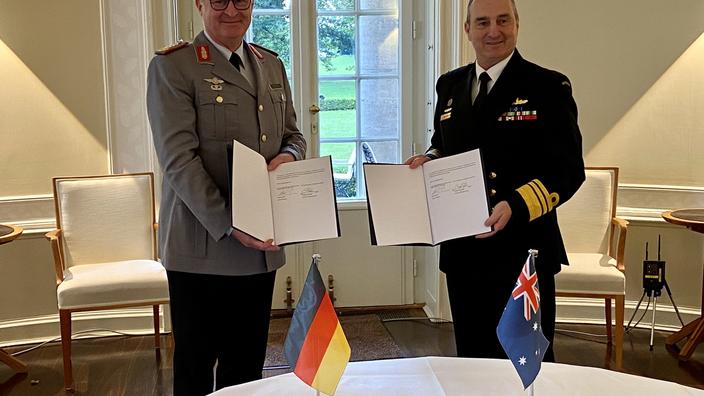While France has been grappling with Australia for a week over the submarine crisis file, General Eberhard Zorn, Chief of Staff of the German Army, posted photos on Twitter that did not did not fail to react.
Accompanied by Admiral David L. Johnston, vice-chief of the Australian Defense Forces, the soldier welcomes the signing of a letter of intent for a "Military Space Partnership" between the two countries.
"
Australia and Germany want to deepen the dialogue on security and the space situation,
" writes the senior official.
Read alsoSubmarine crisis: the president of Naval Group breaks the silence
The timing of the announcement questions.
How can Germany boast of an agreement with Australia, when the latter has just broken the "contract of the century" with its main partner, France?
Especially since, the next day, the Minister of Foreign Affairs, Michael Roth, publicly supported France, believing that the submarine affair was "
a wake-up call for everyone in the European Union.
".
He also warned that Europeans should "
ask themselves the question of how to consolidate our sovereignty
" and "
show more unity on questions of foreign policy and security
".
A "cooperation in space surveillance"
In the space sector, a “letter of intent” indicates the will of several governments to cooperate on common programs, data exchanges and procedures set up with the aim of mutually enriching their databases. “
This generally results in intergovernmental agreements that allow military communities to talk to each other,
” says Xavier Pasco, director of the Foundation for Strategic Research (FRS), which coordinates research there concerning space, high technologies and Security. Here, "it
concerns cooperation in space surveillance
," comments the specialist. For our neighbors across the Rhine, this agreement is a significant asset, because they have few overseas territories: "
Australia is an interesting base, because Germany will have access to the surveillance sensors of the southern hemisphere, which will amplify the tracking capabilities of space objects, for example to avoid a collision or better manage a difficult atmospheric re-entry
”, analysis Xavier Pasco.
Read alsoSubmarine crisis: Scott Morrison, France's worst allies
Since 2019, Germany already has a civil space partnership with Australia, "
like France also has
," recalls the researcher. Moreover, "
all the countries sign dozens of bilateral agreements with various countries in the civil space field
", he adds. These partnerships "
facilitate the exchange of data, personnel
", as well as "
joint research on satellites and joint work to think about a future project
". On the other hand, the announcement of military cooperation reflects a desire to forge a closer relationship. Above all, in the current context, "
Australia is really an important platform for the American military system
", explains Xavier Pasco."
By signing with Australia, Germany is signing with a country that has a special relationship with the United States.
There is therefore a particular symbolism
”, in the midst of the submarine crisis, assures the director of the FRS.
An unfortunate timing, but two very distinct events
However, "
you have to know how to be right and not fall into a climate of paranoia,
" warns Éric-André Martin, secretary general of the Study Committee on Franco-German Relations (Cerfa) at the French Institute of International Relations ( Ifri). “
This is a technical cooperation agreement. It has nothing to do, through its political and diplomatic impact, with the issue of the submarine contract. That two generals have contacts and sign an agreement, it's normal,
”he says. The specialist also regrets that this case has been blown out on social networks: "
There is an unfortunate conjunction in time, but we absolutely must not link the two
". If Xavier Pasco isalso questions "
on the timing
Could this announcement have been postponed once the crisis has passed?
"
These are agreements that establish relationships forged over months, even years,
" argues the director of the FRS.
“
We are not in a war situation, but in a politico-diplomatic crisis.
The clocks of the world keep ticking with the submarine crisis.
The visit of a general is planned well in advance
”, abounds Éric-André Martin.
Read alsoCrisis of the submarines: behind the scenes of the "betrayal" of the century
But should the latter have shown more discretion in the current conditions? "
The way this announcement is made, with the general taking advantage of it when all this is happening, and where Europe and even Germany have a very reserved position on the United States and Australia , it's a bit tricky,
”says Xavier Pasco. The more so as in another tweet, published the next day, the high-ranking officer also boasted, photo in support, of a "
good exchange
" with his namesake, the American general Mark A. Milley, about possible “
joint operations and training projects
”.
But for Éric-André Martin, "
the general must have taken a long time to negotiate this agreement, so we cannot blame him for publicly congratulating himself on it
".
More broadly, the specialist calls for close ranks at the level of the European Union.
"
This specific failure should not contaminate Europe,
" he warns.
“
You have to be careful not to get the wrong enemy.
France has acquired a kind of sympathy capital with this affair.
We must take advantage of this to show that this is a problem for Europe, and not just for France
”.

